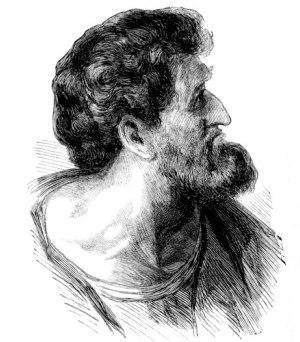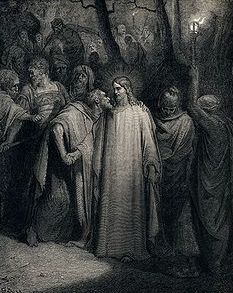Judas
Iscariot
 Every story needs a villain and Judas Iscariot fills this
role in the gospels. He is the apostle who betrays Jesus and
helps the Jerusalem authorities arrest him. Judas may have
enjoyed a privileged position among Jesus' apostles -- John
describes him as the band's treasurer and he is often
present at important times. John also describes him as a
thief, but it seems implausible that a thief would have
joined such a group or that Jesus would have made a thief
their treasurer.
Every story needs a villain and Judas Iscariot fills this
role in the gospels. He is the apostle who betrays Jesus and
helps the Jerusalem authorities arrest him. Judas may have
enjoyed a privileged position among Jesus' apostles -- John
describes him as the band's treasurer and he is often
present at important times. John also describes him as a
thief, but it seems implausible that a thief would have
joined such a group or that Jesus would have made a thief
their treasurer.
Some read Iscariot to mean "man of Kerioth," a city in
Judea. This would make Judas the only Judean in the group
and an outsider. Others argue that a copyist error
transposed two letters and that Judas was named "Sicariot,"
a member of the party of the Sicarii. This comes from the
Greek word for "assassins" and was a group of fanatical
nationalists who thought that the only good Roman was a dead
Roman. Judas Iscariot could have been, then, Judas the
Terrorist.
Judas Iscariot is known as the companion of Jesus who
betrayed him -- but what and how did he betray? That isn't
clear. He points out Jesus in the Garden of Gethsemane. This
is hardly an action worthy of payment because Jesus wasn't
exactly in hiding. In John, he doesn't even do that much.
Judas doesn't actually do anything except fulfill the
narrative and eschatological need for the Messiah to be
betrayed by someone.
Judas Iscariot filled a necessary literary and
theological role in the gospels by betraying Jesus. Someone
had to do it and Judas was picked. It's questionable whether
Judas even acted of his own free will. There was no option
for Jesus not to be executed because without his
crucifixion, he could not rise again in three days and thus
save humanity. To be executed, though, he had to be betrayed
to the Jewish authorities -- if Judas hadn't done it,
someone else would have.

 Every story needs a villain and Judas Iscariot fills this
role in the gospels. He is the apostle who betrays Jesus and
helps the Jerusalem authorities arrest him. Judas may have
enjoyed a privileged position among Jesus' apostles -- John
describes him as the band's treasurer and he is often
present at important times. John also describes him as a
thief, but it seems implausible that a thief would have
joined such a group or that Jesus would have made a thief
their treasurer.
Every story needs a villain and Judas Iscariot fills this
role in the gospels. He is the apostle who betrays Jesus and
helps the Jerusalem authorities arrest him. Judas may have
enjoyed a privileged position among Jesus' apostles -- John
describes him as the band's treasurer and he is often
present at important times. John also describes him as a
thief, but it seems implausible that a thief would have
joined such a group or that Jesus would have made a thief
their treasurer.
